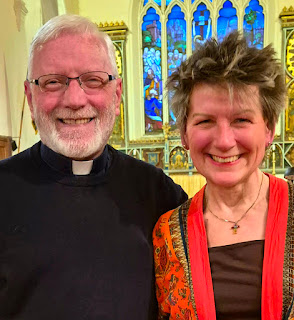Compassion! Compassion! Compassion!
Compassion! Compassion! Compassion! Three times this
word appears in the Responsorial Psalm of the seventh Sunday and four times we
respond, “the Lord is compassion and love” and this response is our act of
faith. We believe it, and when God says something three times He means us to
take particular notice, He wants us to experience His compassion.
Jesus indicates in the Beatitudes that compassion is
the perfect expression of who God is. In Matthew’s Beatitudes He calls us to “be
perfect as your heavenly Father is perfect”, while in Luke’s Beatitudes he
says, “be compassionate as your heavenly Father is compassionate.”
Christians are called to the highest level of
compassion, a compassion that distinguishes us from society at large, a
compassion that drives us to treat others as we would like to be treated
ourselves, to speak to others as we would like to be spoken to, to speak about
others as we would like to be spoken about ourselves. We can rise to and maintain
such heights of goodness because we have encountered the God who is compassion,
because we become living testament of His compassion.
Compassion in the Bible is expressed in terms of the
love that a father has for his children, the feeling that a mother has for the
child in her womb. Those who have the privilege of being mother or father know
exactly what God means. The rest of us can only guess, find ways of connecting into
such instincts and feelings.
Intellectually and spiritually, I am convinced about
compassion; sometimes I even experience it emotionally when I pray but I’m not
sure that my body knows much about the physical compassion of God. I experience
the affective love of God from many people, but my celibate body only gets rare
physical encounters with the compassion of God.
And our experience of God is meant to be physical as
well as spiritual, emotional, intellectual because Jesus is God made flesh, the
compassion of God in bodily form and expression. In His departure from this
world Jesus could have left us a purely spiritual legacy but He left us His
Body and Blood in the Eucharist, a physical as well as spiritual presence, to
minister to our bodies as well as our souls.
I couldn’t resist walking in Eunice the other day, the
magnificent wildness of the high sea at a safe distance, the challenge of
pressing against the wind, failing at times to move forward, being tossed about
like a rag doll. It was possibly the strongest wind I have ever encountered. It’s
like pressing forward against the winds of life, the pressure, the hurt, the challenge,
and the impact it all has on our bodies, bodies that need ministering to.
In that spirit I went to anoint a ninety-four-year-old
woman in the hospital. She was confused and agitated, sitting on her chair with
her head bowed so that I had to go on my knees in front of her so we could look
at each other. It’s always a blessed thing to go on one’s knees before another.
Telling her how beautiful her smile and hair brought a response and, asking if
she would like a blessing, I placed my hand on her head, prayed, anointed her
with oil. Her physical response was instant as were her emotional, mental, and
spiritual responses. It was as if she melted back into the chair, eyes closed,
hands joined on her lap, in a state of total silence, relaxation and peace. We remained
like that in silence for a while until she opened her eyes and asked her
daughter, “has he finished?” Jesus usually laid His hands upon the sick, a
physical touch that brought healing. It has a similar effect when we do it as
priests in His name.
At the family Mass there is ample evidence of the
physical compassion of God in the way that parents hold their children,
children leaning into parents. It is to be seen in the physical intimacy of
loving couples, the tender hug of friends. All of these are essential aspects
of the Christian religious experience.
But sometimes our bodies are stiffened against such
tenderness, so great is the weariness, so deep the hurt and some of us become
unused to physical tenderness as has happened to many in the past couple of
years. Hugs are very welcome but are few and far between and most don’t last
long enough for the body to melt.
I’m wondering if a long, hot Radox bath would do it
for me! I joke!
The celibate life is to a great extent one of fasting
from such physical tenderness and compassion. It is the altar of our sacrifice,
the sacrifice of love. I don’t complain about this at all because it is the
life to which I have been called, one that I have chosen to live but I am
wondering when will the fullness of God’s compassion be realized in my body.
I expect it will reach its highest point on earth when
I die, in that moment when my body will fully surrender as my soul departs on
its final journey homeward. And its absolute perfection will come in the
resurrection at the end of time when we hope to be at once perfectly physical
and perfectly spiritual without any division or distinction between the two,
without any strain; when we are one with ourselves, with each other and with
God. When Eden is restored!





.jpg)


.jpg)



Comments
Post a Comment